
The Taipei Economic and Cultural Representative Office (TECRO), also known as Taipei Economic and Cultural Office (TECO), Taipei Representative Office (TRO) or Taipei Mission, is an alternative diplomatic institution serving as a de facto embassy or a consulate of the Republic of China to exercise the foreign affairs and consular services in specific countries which have established formal diplomatic relations with the People's Republic of China. The PRC denies the legitimacy of the ROC as a sovereign state and claims the ROC-controlled territories as an integral part of its territory. An exclusive mandate, namely One-China policy, requires that any country wishing to establish a diplomatic relationship with the PRC must first sever any formal relationship with the ROC. According to The Fletcher Forum of World Affairs, "non-recognition of the Taiwanese government is a prerequisite for conducting formal diplomatic relations with the PRC—in effect forcing other governments to choose between Beijing and Taipei." As a result, these countries only allow the ROC to establish representative offices instead of a fully-fledged embassy or consulate for the purpose of conducting practical bilateral relations without granting full diplomatic recognition.

The Canadian Trade Office in Taipei is Canada's trade office in Taiwan, which functions as a de facto embassy in the absence of official diplomatic relations in which Canada recognized the People's Republic of China in October 1970 in accordance with the one-China policy.

Since its founding in 1949, the People's Republic of China (PRC) has had a diplomatic tug-of-war with its rival in Taiwan, the Republic of China (ROC). Throughout the Cold War, both governments claimed to be the sole legitimate government of all China and allowed countries to recognize either one or the other. Until the 1970s, most Western countries in the Western Bloc recognized the ROC while the Eastern Bloc and Third World countries generally recognized the PRC. This gradually shifted and today only 11 UN member states recognize the ROC while the PRC is recognized by the United Nations, as well as 181 UN member states, Cook Islands, Niue and the State of Palestine. Both the ROC and the PRC maintain the requirement of recognizing its view of the One China policy to establish or maintain diplomatic relations.

China–German relations were formally established in 1861, when Prussia and the Qing dynasty concluded a Sino-German treaty during the Eulenburg expedition. A decade later, the German Empire was established, with the new state inheriting the Prussian-era treaties concluded with China. Sino-German relations during the late 19th and early 20th century were frequently tense, as Germany followed the example of other European colonial powers in carving out a sphere of influence in China; by 1914, Germany had obtained several concessions in China, including the treaty ports of Yantai and Qingdao and most prominently the Jiaozhou Bay Leased Territory.
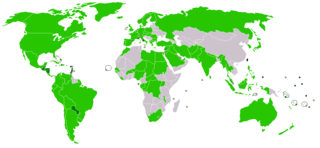
Numerous states have ceased their diplomatic recognition of the Republic of China during the last 70 years, since the founding of the People's Republic of China. Under the One China policy, the ROC is recognized by 11 UN member states and Holy See with 59 UN member states and Somaliland maintaining unofficial cultural and economic relations.
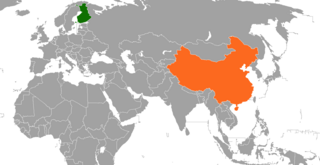
Finnish-Chinese relations are the foreign relations between Finland and China.

Foreign relations between Austria and Georgia. Both countries established diplomatic relations in 1992 and Georgia opened its embassy in Vienna in 1996. Austria is represented in Georgia through a non resident ambassador based in Vienna, and through an honorary consulate in Tbilisi. Georgia has an embassy in Vienna and an honorary consulate in Graz. Austria is a member of the European Union, which Georgia applied for in 2022. Both nations are members of the Council of Europe.
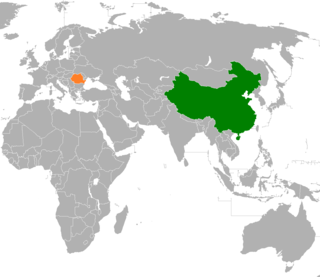
The Kingdom of Romania and Republic of China (ROC) began relations on July 5, 1939.
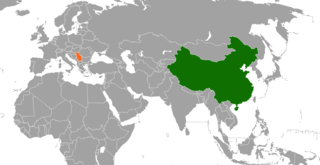
China-Serbian relations are foreign relations between the People's Republic of China and the Republic of Serbia. Relations have been maintained since SFR Yugoslavia's recognition of PR China on October 1, 1949, while diplomatic relations between the two countries were formally established by the exchange of diplomatic notes between the two Foreign Ministers on January 2, 1955. China has an embassy in Belgrade and also maintains an office in Priština based on consent of the Government of Serbia from November 2006. Serbia has an embassy in Beijing and a consulate-general in Shanghai. In 2017, Serbia and China mutually abolished the requirement of obtaining an entry visa for its citizens.

China–Lithuanian relations are the bilateral foreign relations between the People's Republic of China (China) and Lithuania. The PRC has a chargé d'affaires in Vilnius. In December 2021, Lithuania closed its embassy in Beijing.
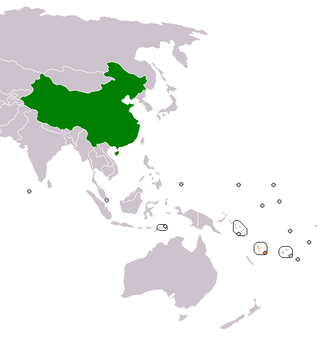
The Republic of Vanuatu and the People's Republic of China (PRC) established official diplomatic relations on March 26, 1982. China established an embassy in Vanuatu in 1989, while Vanuatu established an honorary consulate in China in 1999; it officially became an embassy in 2005. The current Ambassador of China in Vanuatu is Liu Quan. The current Ambassador of Vanuatu in China is former Minister of Finance Willie Jimmy.

The 1955 Austrian State Treaty ended the four-power occupation and recognized Austria as an independent and sovereign state. In October 1955, the Federal Assembly passed a constitutional law in which "Austria declares of her own free will her perpetual neutrality." The second section of this law stated that "in all future times Austria will not join any military alliances and will not permit the establishment of any foreign military bases on her territory." Since then, Austria has shaped its foreign policy on the basis of neutrality.

China–Palestine relations, also referred to as Sino–Palestinian relations, encompasses the long bilateral relationship between China and Palestine dating back from the early years of the Cold War.

This article contains several lists of ambassadors from China. The incumbents change from time to time; sometimes a post starts or stops being temporarily headed by a lower ranking diplomat. Occasionally, a post is created or abolished.

Germany–North Korea relations are the bilateral relations between Germany and the Democratic People's Republic of Korea (DPRK), commonly known as North Korea. During the Cold War, East Germany maintained diplomatic relations only with North Korea, while West Germany maintained diplomatic relations only with South Korea. East Germany ceased to exist upon German reunification, which meant that diplomatic relations no longer existed between Germany and North Korea. The two countries appointed protecting powers to represent their interests in the other country, Sweden being the protecting power for Germany, and China being the protecting power for North Korea.

Central African Republic-Germany relations are the bilateral relations between the Central African Republic (CAR) and Germany. The relations between both countries are described by the Federal Foreign Office as "problem-free, but of low intensity". Since the closure of the German Embassy in Bangui, the German Embassy in Cameroon has been responsible for relations with the Central African Republic. The Central African Republic is one of the few countries that does not have its own embassy in Germany. The Central African Embassy in Paris is responsible for relations with Germany.
















